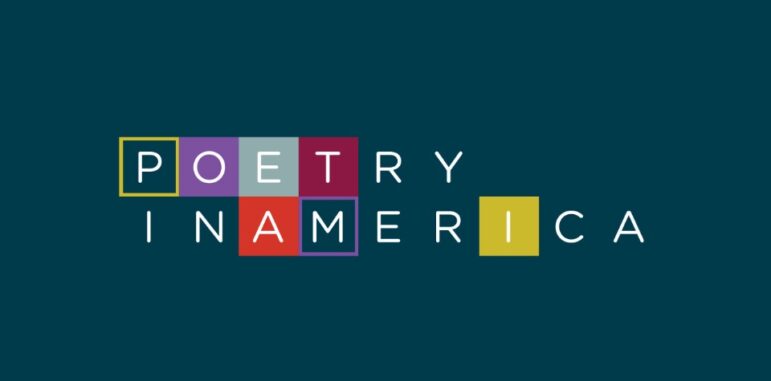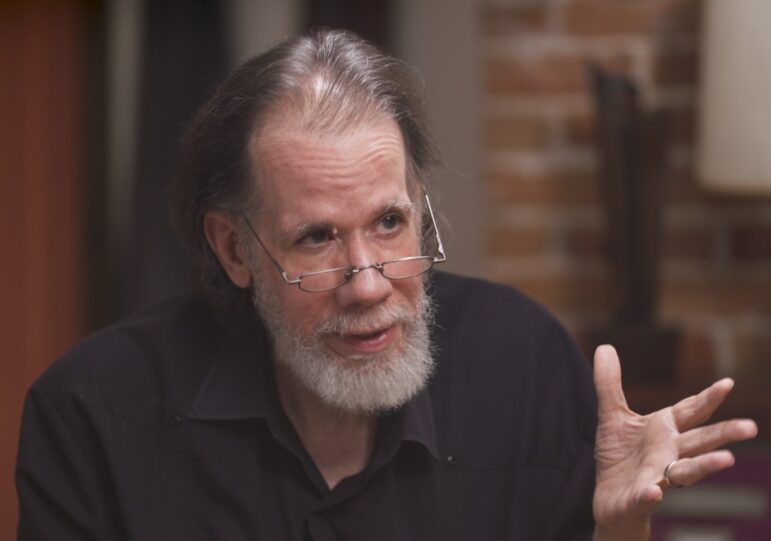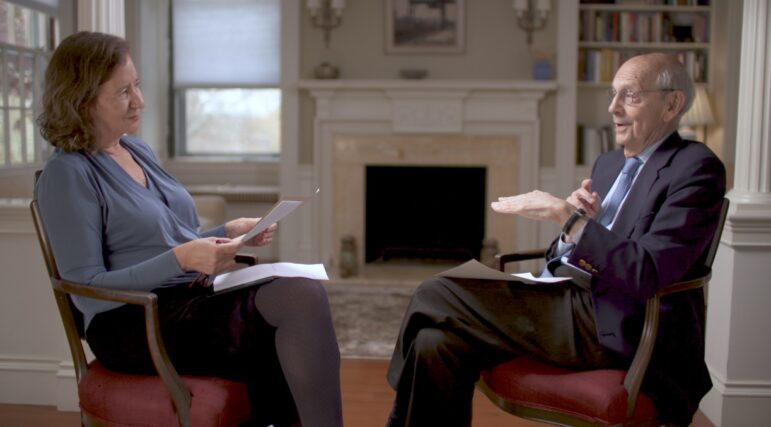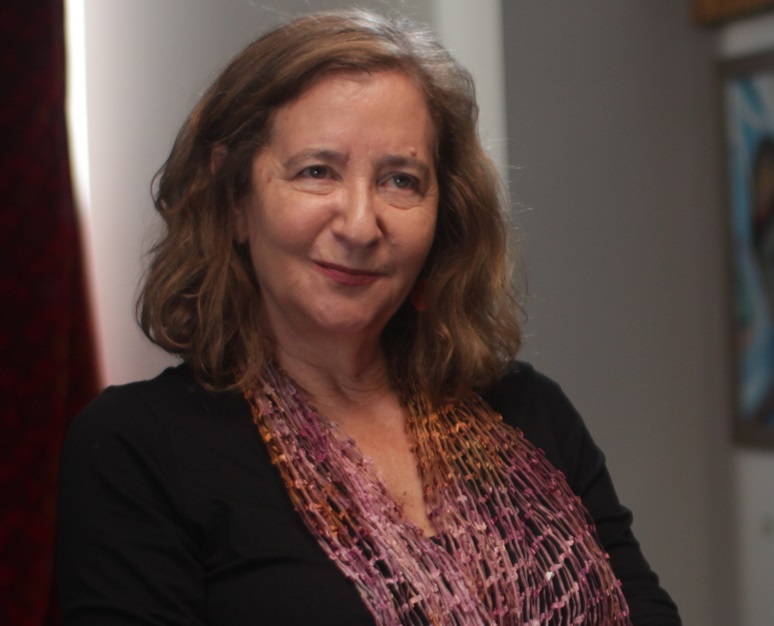By BEVERLY STODDART, InDepthNH.org
No matter the subject, a good television program can draw you in, reaching a part of your brain and seizing your emotions, arousing your senses, and taking you to a place where outside noises stop, and you are caught in the enjoyment of the creativity. Poetry has the power to get into your brain when you hear or read a poem that gets you, emotionally. You say, yes, I understand what it is saying.
For those who love poetry and for even those who hate it, Harvard professor, Elisa New, has found, perhaps, the amazing path to getting to know poetry by creating Poetry in America, “a public television series and multi-platform educational initiative.” She and I had a conversation about the program now in its fourth season presented by Arizona PBS and American Public Television.

So, how does she capture poetry so differently that you will sit and watch and let your brain be drawn in? She tells me, “Poetry has more often been part of public rituals, performances, part of a three-dimensional world.”
“Poems were often written for public occasions. They appeared in illustrated magazines. They came with illustrations, and so I think of the audio-visual aspects of the show as really restoring poetry to some of its origins.”

Martin Espada in “Who Burns for the Perfection of Paper,” on Poetry in America.
The note I made after watching the Season 4 episode titled, “Who Burns for the Perfection of Paper,” by Martín Espada was that she had cracked the poetry code.
The episode speaks about poverty when women worked in water-powered paper mills and children worked in factories at hard labor. Espada, born in 1957, worked for minimum wage at a printing plant that printed legal-sized note pads where he would slip cardboard between the yellow pages and then brush red glue on the edge. He couldn’t wear gloves and the paper would shred his hands with tiny slits and the red glue would sting. All of this is shown in graphic form, in an anime style of visuals and movement, and with original music by Wendy Ultan: the seven-foot stacks, the hands working the sheets of paper, the hands with a hundred cuts, “upturned and burning.” The music carries us along this story of the young Espada, alone and working until late in the night, the poverty that accompanies the need to have children work in factories. The story is visual, audible, and revelatory in its description and the reading of the poem. This is the story of a man who became a lawyer and defended those who needed help. The episode ends with a graphic of hands upturned, prayerful and according to Espada, a system “that is still burning.” Espada is a professor at the University of Massachusetts Amherst and is a 2021 winner of the National Book Award for Poetry for his poem, “Floaters,”

Elisa New and Retired Supreme Court Justice Stephen Breyer discuss Martin Espada’s poem.
Elisa is the writer, director, and creator of Poetry in America. We talked about how poetry serves as a vehicle for the broader vision of America. I asked her if that was her original plan.
“I was, for a long time, a professor of American literature which is to also say a professor of American history and culture, and American poetry. I’ve studied it era by era, decade by decade, region by region, it is a lens into all the communities across America, what it felt like before the Civil War, during the Civil War, after the Civil War, how industrialization is best responded to and so, I’ve always in my many years of teaching, taught poetry as a historical medium.”
To bring you to the place of amen and agreement, Elisa New gathers those who you would not imagine as poetry experts. The “distinguished interpreters” as they are defined come from all places. Among them are cellist Yo-Yo Ma, U.S. Senator John McCain, biologist E.O. Wilson, Rabbi Tiferet Berenbaum, U2 lead singer, Bono, Retired US Supreme Court Justice, Stephen Breyer, Vietnam War Veteran, Roger Harris, playwright Tony Kushner, geologist, Daniel Schrag, actor, John Turturro, fashion designer, Catherine Walker, President Bill Clinton, and real estate developer & CEO SOHO China, Zhang Xin, along with many, many others.
In Season One, Elisa and hip hop artist, Nas, discuss his song, N.Y. State of Mind, and they “break down the breakbeats” and “explore the searing vision,” of the music along with music executive Steve Stoute, and scholar, writer, and feminist activist, Salamishah Tillet.
Season One included an episode titled, Fast Break, where she asked NBA players Shaquille O’Neal, Pau Gasol, and Shane Battier to join American poet and critic, Edward Hirsch, to discuss his poem of the same name.
New said sometimes her guests will say, “Wow, no one ever asks me to read a poem,” and “that might be interesting.” She goes on to say, “I think the people who do say yes are kind of interested and curious. And I say, you can say anything you want, we’re not talking about anything but this poem.” She has called this the enthusiasm of discovery. She is bringing her guests to the point of thinking about the selected poem, reading it, and drawing new conclusions.
“That’s the beauty of poetry,” she reminds us, “that the words are so alive, that even if you read the poem three times before and you say, okay I know what this poem is about…and then if I say, well, how does the word kiss strike you?” Elise will then take the guests out of their perceived notion of knowing the poem.
“Shaquille O’Neil was on the show. We did a beautiful poem by Edward Hirsch, who’s a very distinguished poet who is now the head of the Guggenheim Foundation. He’s a tall guy and he was a very enthusiastic basketball player as a young man. He wrote a really beautiful poem about basketball.” She explains this big guy, O’Neil, “came bombing in, he came to the interview knowing what he was going to say but I slowed him down and I said let’s listen to the first line of this poem.”
A hook shot kisses the rim and
Hangs there, helplessly but doesn’t drop,
They dive into the interpretation. Elisa asks, “What does that say to you, kisses the rim?”
He replies, “On the one hand, it’s very gentle, like a kiss. Right? On the other hand, it’s like,” she gestures with her hand and says mwah to represent a kiss.
“Those are two very different interpretations. Both are completely supported by that word. All I really had to do was slow him down, and then we understood that line that much better.”
When I asked Elisa how she makes all of this happen and who pays for it, she replied, “I had to raise all the money for the show, through grants.” This is astounding to me that with no assistance from PBS, she would have to fund this creative idea.
“They operate on shoestrings. There’s a little bit of revenue that comes from digital sales, not nearly what it costs to make. Fortunately for me, there are enlightened donors who think it’s a good thing to have, including the National Endowment for the Humanities and the Sloan Foundation and others, who think it’s a good thing for the American public to have an ongoing television series on poetry and so we’ve now funded four seasons, and I anticipate we will fund the next and some after that. It is hard work.”
Not only is New the host of Poetry in America, but she is the director, producer, and a writer. I say to her that’s quite a learning curve.
“I learned on the job. In the very early days, we had the idea that there would be another director and producer. I worked with this person for a little while and realized he might know how to be a director and producer of a documentary, but he really didn’t understand the poetry. What it needed from a director was someone who could figure out essentially how to teach a poem, what were the really important elements, and who wouldn’t skate over the ambiguities and the difficulties that’s in a way the pleasures of these poems. That’s where they get deep. I kind of learned on the job. I do have an amazing editor I work with who we work side by side or by Zoom.”
“His name is Peter Rhodes and he’s won many awards. He was trained by the BBC and he and I have an extraordinary collaboration. I write the narration and we just go back and forth. We hire illustrators. We hire musicians. We hire animators. And, we have photographers go out. It’s a team.”
Poetry in America is not just a television series, it is an education course as well. Elisa explained.
“I started this as a professor, originated as online course content. As the work progressed in parallel with the television series I was developing online courses. And so now I have multiple in-school programs, including programs at Harvard University, where students take Poetry in America courses. But the biggest program I have is at Arizona State University where I’ve now taken a job and this program reaches high school students primarily in Title I schools where students can get three college credits for completing a Poetry in America course. Their families pay nothing. Their school systems or local philanthropies pay a deeply discounted tuition. We have very high completion rates for the kids, which is one of the things I’m proudest of. There are lots and lots of kids who take these courses as juniors or seniors, they’re on their way to college. Often they come from schools where they’re overcrowded. They often have very committed teachers but the preparation for college-level work that many of them need, they’re not getting in their classrooms. This gives them exposure to what college-level expectations are. In many cases, gives them exposure to a kind of reading to the humanities they hadn’t imagined. Many of them say, I didn’t think I liked poetry, but they do.”
PART TWO: Poetry in America: Finishing the Hat and Mushrooms, Weakness and Doubt






